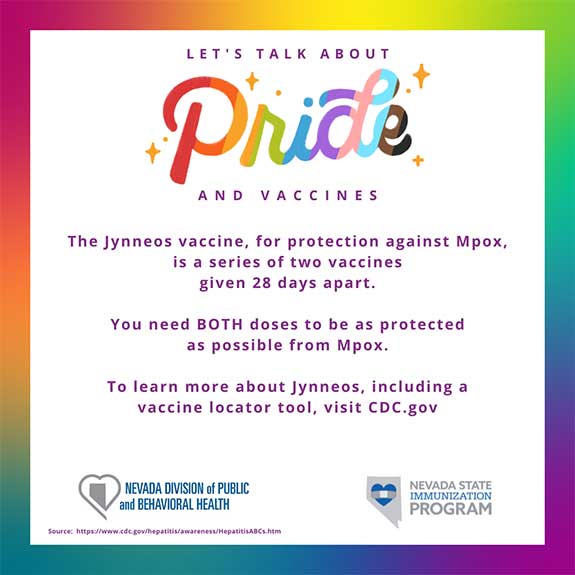Two Doses of Mpox Vaccine Offer Maximum Protection
Health District Urges Mpox Vaccinations for Those Most at Risk
Article contributed by Southern Nevada Health District
According to Southern Nevada Health District officials, if you had one dose of the mpox vaccine that is a good start but getting two doses not only offer you better protection it can make spreading the virus less likely. And if you do get mpox, being fully vaccinated may help reduce your symptoms and make them easier to manage. The bottom line is two doses are better than one! The vaccine is readily available at Health District clinics, and you can make an appointment today at https://tinyurl.com/33h9zrh8.

In Southern Nevada, mpox (formerly known as monkeypox) case reports have remained steady, and the last reported case was in February 2023, with most of the cases reported in Clark County occurring between July and August of 2022. Dr. Cassius Lockett, Director, Disease Surveillance and Control for the Health District, emphasizes that recent case clusters in other communities demonstrate the potential for a resurgence.
“Although gay, bisexual and men who have sex with men have been most impacted, we know that anyone, regardless of their sexual orientation or gender identify, can be at risk of mpox if they are exposed to the virus,” said Dr. Lockett. “By continuing to provide access to the vaccine, information and mpox resources we can help people make informed choices that will help to protect themselves and others in situations where mpox may spread.”
The Centers for Disease Control and Prevention (CDC) and Health District recommends vaccination against mpox if:
- You have been exposed or had a suspected exposure to someone with mpox.
- You had a sex partner in the past two weeks who was diagnosed with mpox.
- You are a gay, bisexual or other man who has sex with men or a transgender, nonbinary or gender-diverse person who has had any of the following within the past 6 months:
- A new diagnosis of one or more sexually transmitted diseases (such as chlamydia, gonorrhea or syphilis)
- More than one sex partner
- You have had any one of the following in the past 6 months:
- Sex at a commercial venue such as a sex club or bathhouse
- Sex at a large gathering or commercial event, or in a geographic area (city or county) where mpox transmission is occurring
- Sex in exchange for money or other items
- You have a sex partner with any of the risks mentioned above.
- You anticipate experiencing any of the risks mentioned above.
- You have HIV or other condition that suppresses your immune system and have had a recent mpox exposure or you anticipate a future risk mentioned above.
“If you did get your first dose a long time ago, you can still get the second dose of the vaccine, and I would encourage you to do so as soon as possible,” said Dr. Cort Lohff, Chief Medical Officer for the Health District.
Dr. Lohff advises people who are at risk that there are additional steps they can take to protect themselves from getting mpox. Recommended prevention measures are avoiding close skin-to-skin contact with people who have a rash that looks like mpox. This means do not kiss, hug cuddle or have sex with someone with mpox. Don’t share items such as eating utensils or cups with a person who has mpox, and do not handle or touch the bedding, towels or clothing of a person with mpox. Wash your hands often with soap and running water, especially before eating or touching your face and after using the bathroom. If soap and water aren’t available, use an alcohol-based hand sanitizer.
If you will be participating in social activities this summer such as festivals, parties, clubs and other gatherings, consider how much close, personal, skin-to-skin contact is likely to occur at the event. If you feel sick or have a rash, don’t attend any social events, and see a health care provider. The CDC provides more information about safer sex, social gatherings and mpox on its website.
The Health District also recommends staying current on your sexual health care, including getting tested for HIV and other sexually transmitted infections. See your health care provider or visit www.SNHD.info for more information and to access Health District services, including the Southern Nevada Community Health Center and Sexual Health Clinic.
Since the first case was identified in June 2022, the Health District has been collaborating with its partners to provide resources, education, information and access to vaccines. Our agency is committed to these ongoing efforts to ensure the needs of our community are met and we are promoting a safe and healthy environment for all.
This article was originally published in the 2023 August/September Issue of Las Vegas PRIDE Magazine, and can be read in its original format here.



